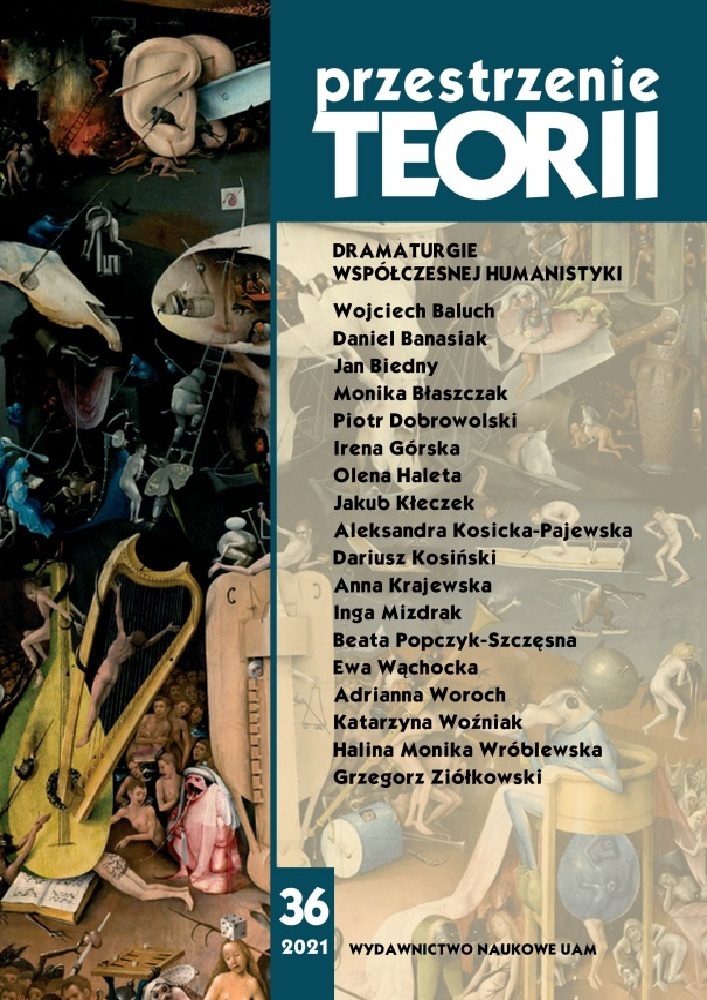Abstract
The article is an attempt to answer the question of how contemporary performative acting enters into artistically and cognitively significant interactions with the new Polish dramaturgy. The relationship between the two forms of art is discussed in relation to two types of acting: task-oriented and performative. The concept of both types of acting is derived from the analysis of selected contemporary theater and television productions of dramas and scenarios arising from the achievements of the latest Polish dramaturgy. The examples that are analyzed reveal various aspects and types of the actors’ performative game, which include the issues of the actor’s subjectivity, their presence on stage and the materiality of the body. Unlike many of today’s discussions, the interpretations and comments on selected scenes and fragments of a performance do not focus on the subversive dimension of the above-mentioned aspects of acting, but look for new perspectives of reception and, at the same time, broaden the areas of theatrical experience. These new perspectives and areas are triggered by references to the affective and mental processes of reception, which allow perceptions to exclude, at least partially, the tendency to automatically interpret everything that surrounds them. The analyses featured in the article therefore aim to describe those aspects of performative acting that enable the viewer to derive benefit from what the new Polish dramaturgy offers.
References
Katafiasz O., Pułapka nadmiaru, teatralny.pl, https://teatralny.pl/recenzje/pulapka-nadmiaru,1141.html (dostęp: 20.07.2021).
Kościelniak M., Spektakl terrorystyczny, e-teatr, https://e-teatr.pl/spektakl-terrorystyczny-a196414 (dostęp: 20.07.2021).
Kyzioł A., Hamlet roz(s)trojony, „Polityka” 23 czerwca 2015.
Mrozek W., Świetny spektakl „Wszystko o mojej matce”. Co łączy Borczucha z Almodóvarem?, wyborcza.pl, https://wyborcza.pl/7,75410,19982317,swietny-spektakl-wszystko-o-mojej-matce-co-laczy-borczucha.html (dostęp: 20.07.2021).
Soszyński P., Język rozkłada każde ciało, https://e-teatr.pl/jezyk-rozklada-kazde-cialo-a197199 (dostęp: 20.07.2021).
Targoń J., Hamlet przekręcony, gazeta.pl, https://krakow.wyborcza.pl/krakow/7,35796,18129193,stary-teatr-hamlet-przekrecony-recenzja.html (dostęp: 20.07.2021).
License
Authors
Authors of texts accepted for publication in Przestrzenie Teorii are required to complete, sign and return to the editor's office the Agreement for granting a royalty-free license to works with a commitment to grant a CC sub-license.
Under the agreement, the authors of texts published in Przestrzenie Teorii grant the Adam Mickiewicz University in Poznań a non-exclusive, royalty-free license and authorize the use of Attribution-NonCommercial-NoDerivatives 4.0 International (CC BY-NC-ND 4.0) Creative Commons sub-license.
The authors retain the right to continue the free disposal of the work.
Users
Interested Internet users are entitled to use works published in Przestrzenie Teorii since 2015, for non-commercial purposes only, under the following conditions:
- attribution - obligation to provide, together with the distributed work, information about the authorship, title, source (link to the original work, DOI) and the license itself.
- no derivatives - the work must be preserved in its original form, without the author's consent it is not possible to distribute the modified work, such as translations, publications, etc.
Copyrights are reserved for all texts published before 2015.
Miscellaneous
Adam Mickiewicz University in Poznań retains the right to magazines as a whole (layout, graphic form, title, cover design, logo etc.).

